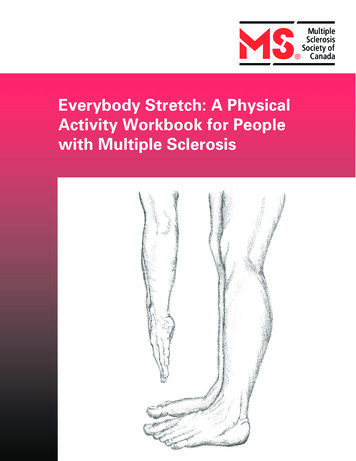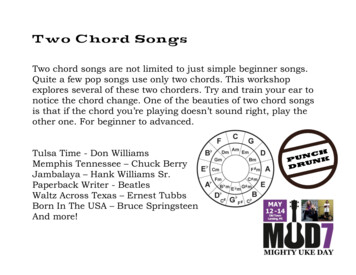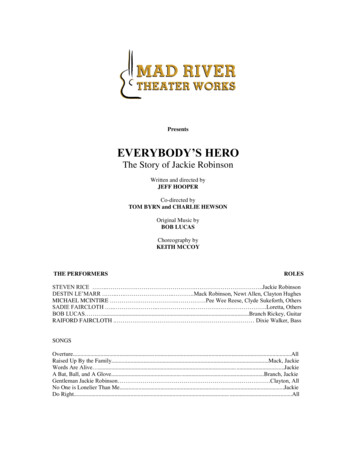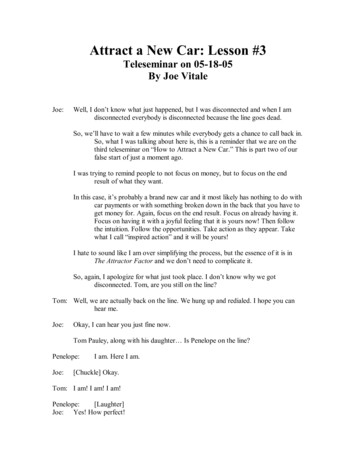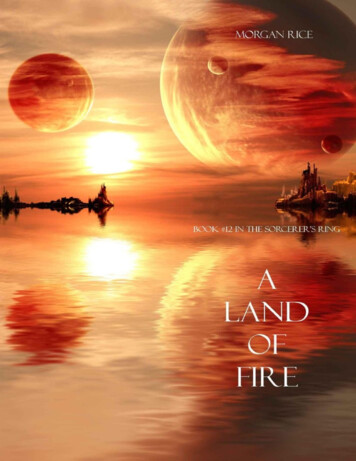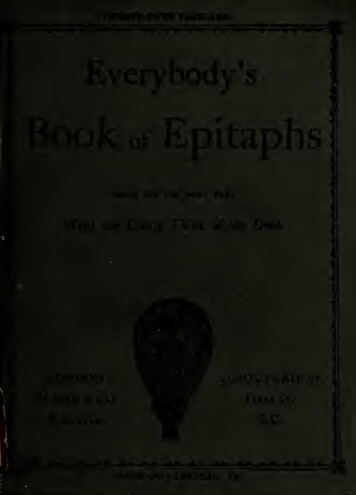
Transcription
Everybody’s Book of EpitaphsBEING FOR THE MOST PARTWhat the Living Think of the DeadCOMPILED BYLONDON23 BOUVERIE ST.SAXON & CO.Fleet St.PublishersE.C.
M-tar uci,.-vrJttfta 12,*‘ * ** -*it'’,,» ‘ 1*i1„ ’l O'*';. 'crJj ’ ‘*tc V , .U-i.V ,1«- *'- J,., *1 #1‘ JA' ,, c Ji J : Ij ‘)4-*,# »'* * J#
—:o:—Epitaphs were for centuries looked upon as being as necessaryas dying : or—if the necessity of death be doubted—as necessary asfunerals. At any rate they held as important a place in the funerealetiquette of the past as the pomp and show appear to hold in manycases to-day. Very seldom, however, was the epitaph a record of factor an expression of hope. Much oftener—and if it were only occa sionally it would be too often—they had no relation to fact; they re corded no past, and seldom did they depict a past that ought to havebeen. Sometimes they were written by their subject, who feared toleave his reputation to his surviving friends and to—truth ; sometimesthey were written by an expert in that kind of literature for the pay thatit brought him ; sometimes too they were the work of some sincere ifmisguided friend ; and sometimes they were the outcome of a remorsewhich sought to make up for its indifference during the lifetime ofthe departed by a fulsome enumeration of his real or supposed goodqualities after death. And generally, by whomsoever written, epitaphswere—to parody a well-known couplet—an attempt to record onbehalf of the dead :A reputation he had no mind to,And a course of life he was not inclined to.Very rarely indeed among the better kind do we find epitaphs freefrom “self" assertion, either on the part of the departed, or thoseresponsible for the erection of the memorial—which often recordsthe generosity of the latter as ostentatiously as the virtues of theformer.(3)
4PREFACE.Sometimes those epitaphs which record the faith and patience ofthe departed, record, side by side with these, the doubt and im patience—amounting wellnigh, in some instances, to downright un belief and rebellion.Sometimes the record tells of a departed goodness—real, nodoubt—which was the strength and stay of the bereaved, but whichwas never felt in all its power, perhaps not even discovered, until itsabsence had left a gap which nothing else would fill ; and side byside with this is a lament which would be perfectly reasonable andbecoming if, instead of the creature having died, the death hadbeen announced of God Himself. In fact, if, instead of the “ record ing angel ”—of whom we so often hear —an angel were commis sioned to “ blot out the handwriting ” which was not in accordancewith the actual facts, on how many tomb-stones should we read any thing more than the name and dates of birth and death ? Of one thingwe may be sure—no hopeful expression would be blotted out ;everything would be left which could be said to be “ of good report/’There would, however, be some acres of blank space on the tomb stones in every cemetery of considerable size.Another peculiarity of epitaphs in the past was their length, whichin some cases was “prodigious.” This peculiarity was in keepingwith the main purpose of the epitaph, which was mainly fulsomeadulation. It seems as if the writers never knew when or where tostop, and a glance at some of the lengthy ones in this book will showthat the end is often reached with evident regretAn observantman once sent the following lines to a professional epitaph writer :—Friead, in your epitaph I'm grievedSo very much is said :One half will never be believed,The other never read.Now in the case of public servants or benefactors there is nothingto be said against a memorial erected to remind a man’s contempo raries, or to inform succeeding generations of the advantages whichhave resulted from that man’s influence—always provided that therecord is one of fact and that the advantages are real. In somecases the record would be short; in others it would be long ; but inall cases there would be an absence of fulsomeness and flattery, andin no case would that side of the character come in of which it mightbe necessary to say to the epitaph-writer :—“ Nothing extenuate,Nor set down aught in malice.”
PREFACE.5Right feeling would prompt all those who are responsible for anepitaph even of a bad man to scrupulously observe the old saying :“ Nothing but good of the dead ; ” and of course, if nothing goodcould with truth be said—an almost impossible supposition—thennothing would be said at all.It is perhaps fair to say that epitaphs in the past—or those whichhave not been a simple record of facts—serve for the most part moreas a means of discovering the mental attitude of the livingthan of the real character of the departed. And as such, a verylarge number of the epitaphs which have been preserved fromthe past do not serve to show to advantage the common sense—tosay nothing of the reverence and piety ot the survivors.Happily, however, there are signs of a great change for the betterin matters funereal. Even death itself is losing its terrors ; but as“ the last enemy to be destroyed is death,” it is no wonder if he dieshard, and if he is reluctant to part with his old customs. Flowersnow take the place of the huge plumes of a bygone day ; and the dayis coming when the example of a truly great man will be moregenerally followed than at present, and where a simple name andstone will mark the resting-place of the worn-out framework of thedeparted, as for example :—Michael FaradayBorn 22nd September, 1791 ;Died 25th August,1867.After all, the epitaph is of no use if it records imaginary virtues orfaults. The deception cannot be permanent, for time will efface therecord even when of brass, and as to the misrepresented one—heescapes from it without either the advantages of an undeservedglorification or the disadvantages of being maligned.Fact incharacter will last; and granite memorial stones, with inch-deepepitaphs will not alter it. So that except for very exceptional reasonsthe epitaph, beyond the simple name, etc., is unnecessary, and ofsmall moment. As Doctor Horatius Bonar says :—“ My name, and my place, and my tomb, all forgotten,The brief race of fime well and patiently won:So let me pass away, peacefully, silently,Only remembered by what I have done.
6PREFACE.Needs there the praise of the love-written record,’The name and the epitaph graved on the stone ?The things we have lived for, let them be our story,We ourselves but remembered by what we have done.***Not myself, but the truth that in life I have spoken,Not myself, but the seed that in life I have sown,Shall pass on to ages—all about me forgotten,Save the truth I have spoken, the things I have done.So let my living be, so be my dying ;So let my name lie, unblazoned, unknown ;Unpraised and unmissed, I shall still be remembered:—Yes, but remembered by what I have done.
Contents. V A Highland Epitaph, 142,A Puzzle, 136.A Rich Man, 135.Adams, John, 74.Addison, Joseph, 55.Adrian, Pope, 28.Aird, Provost, 81.Aire, Gervase, 125.Alban, St., 34.Aldridge, Thomas, 70.Alexander VI., 184.Alexander the Great,*40.Alfred, King, 17.All, Thomas, 128.Alleyn, Thomas, 180.An Exemplary Wife, 136.Angel, Mary, 82.Anne, Queen (Wife of James I.), 39.Antibia, 55.Archer, John, 192.Arnold, Samuel, 53.Ashworth, Charles, 182.\Badman, 104.Bagshaw, Samuel, 163.Ball, 104.Baret, John, 122.Barklamb, 83.Baxter, 127.Beck, William, 134.Bede, 61.Bell, John, 139.Bennett, Sterndale, 56.Berridge, John, the Preacher, 40.Berry, Dame Rebecca, 176.Berry, John, 75.Biggs, Mary, 185.Bird, Mrs. Susannah, 189.Bird, William, 129.Blackett, Joseph, hi.Blake, Admiral, 118.Bligh, Gideon, 107.Bloomfield, Sarah, 140.Blow, John, 49.Bond, Thomas and Mary, 168.Boone, Nicholas and Elizabeth, 109Bridge, Samuel, 186.Bridger, Samuel, 74.Briggs, Hezekiah, 166.Brougham, Lord, 24.Browning, E. B., 105.Browning, Robert, 45.Bunn, John, 137.
CONTENTS.8Bunyan, John, 60.Burney, Charles, 54.Bums, Robert, 21.Burton, John, 122.Byron, Lord, 19.Brindell, John, 183.ICaldwell, Florens, 97.Campbell, John, 170.‘ Captain,” H. M. S., 42. Carrington, Isabella, 96.Carter, Mary, 142.Carthew, Joan, 147.Cave, 164.Cavendish, Charles, ior.Cavendish, Charles, 97.Chadwick, Rev. Daniell, 143.Chartres, Francis, 115.Chaucer, Geoffrey 49.Chest, 129.Cholmondley, Sir Robert, 45.Clark, John, 132.Clark, Martha, 102.Clarke, Capt. H., 186.Clarke, Nathaniel, 89.Clay, 71.Cleere, Mary, 180.Clemetshaw, Henry, 170.Cobden, 51.Coleridge, Samuel Taylor, 35.Cooke, Anthony, 124.Coombe, Mr., 70.Cooper, Miss Ann, 106.Cooper, Sir Astley, 46.Coram, Thomas, 57.Cotes, Thomas, 189.Cotton, Rev. William, 178.Crewe, Mrs. Phebe, 179.Croft, Sir Henry, 129.Croft, Mr. Thomas, 114.Cromwells, The, 67.Crossfield, Tom, 165.Crytoft, Robert, 146.Cuthbert, John, 116.Darwin, 45Davis Family, 149.Day, 160.De-Foe, Daniel 66.Denham, George, 85.Dial Inscription, 137.Dibdin, 28.Dickens, Charles, 44.Dickie, Molly, 130.Dixon, George, 162.Dixon, John, 106.Dodderidge, Lady, 175.Donne, Rev. John, 29.Dove, John, 159.Dow, Johnnie, 96.Downie, Malcolm, 80.D'Oyly, Sir Cope, no.Drake, Anthony, 92.Dryden, 51.Dudley, Mr., 103.Dyer, Alexander, 132.Eadulph, Bishop of Devon, 121.Eager, John, 183.Edington, William of, 178.Edward, the Black Prince, 17.Elizabeth L. H., 74.Ethelburga, 17.Everard, Edward, 105.Eyre, Elizabeth, 189.Faraday, 35.Fettes, William, 120.Fielding, Anne, 187.Floyer, Mrs. Anne, 134.Foote, the Comedian, 28.Fowler, Alis, 121.Fox, 59.Franklin, Benjamin, 29.Fuller, Dr., 34.Fullerton, Sir James, 26.Garret, Margaret, 178.D’Armati, Salvino Armolo, 191.Darnell, George, 59.Garrick, David, 32.1 Gay, John, 23.Gibbon, Thomas, in.
CONTENTS.Gibson, Anne, 128.Gidley, Bartholomew, 192.Gilbert, Robert, 167.Gippes, Robert, 114,Goldsmith, Oliver, 23.Goodyear, Henry, 128.Gordon, General, 41.Gray, 51.Gray, Catherine, 118.Gray, Robert, 134.Greenhill, Nicholas, 126.Greenhill, Thomas, 82.Greentree, Isaac, 73.Grey, Mr. John, 156.Grote, 50.Gwynne, Mary, 71.Hallam, 45.Hamilton Elizabeth, 138.Hampton, Mr. William, 145.Hardy, Sir Thomas, 67.Hart, Thomas, 153.,Hawles, Harry, 124.Hazlewood, William, 128.Heywick, John, 146.Higley, John, 133.Hill, Doctor Otwell, 72.Hill, Godfrey, 118.Hill, John, 134.Hill, Rowland, 31.Hipponax, 181.Hogarth, 33.Holcroft, Mr., 155.Holden, Thomas, 92.Hood, Robin, 27.Hookham, David, 188.Hooks, Nicholas, 84.Hope, Thomas, 127.Houghton, William, 174.Howard, John, 40.Huddlestone, Thomas, 70.Hulum, John, 152.Hume, David, 20.Huntingdon, William, 27.In Memoriam : Tammy Messer,80.Isnell,Peter, 69.9Jack, John, 133.Jame.s, John, 76.Jenkins, Henry, 161.Jenner, Dr., 44.Jennings, Anne, 91.“Johnnie Laddie,” 139.Johnson, Samuel, 57.Jones, Daniel, 140.Jones, Joseph, 86.Jones, Thomas, Esq., 138.Jonson, Ben, 21 and 27.Keble, 48.Kemp, Thomas, 126.Kildare, Earl of, 150.Killed by Lightning, 157.Kingsley, 52.Knight, Charles, the Author-Publisher,21.Lackington, James, 158.Lamb, Charles and Mary, 20.Lamb, William, 127.Latthow, Daniel, 175.Lawrence, Sir John, 177.Leake, Thomas, 171.Leman, Robert, 169.Lilly, William, 119.Lillywhite (the Cricketer), 34.Littleboy, Emma and Maria, 148.Livingstone, David, 44.Lowder, Mary Ann, 107.Loxley, Mrs. Ann, 115.Lytton, Bulwer, 56.Macaulay, 50.Macbeth, John, 142.Macpherson, Alexander, 108.Macpherson, John, 76.Maningley, Thomas, 1*87.Mann, Ann, 103.Mansfield, Earl, 48.Mansfield, Lord Chief Justice, 25.Marshall, Rev. Edward, 179.Marvell, Andrew, 23.Matthison, William, 144.Medford, Grace, 121.
IOCONTENTS.Meridith, 69.Middlemore, Dorothie, 172.Miles, Mr., 133.Milton, 43.Monger, Thomas, 154.More, 82.More, Miss Eliza, 161.More, Owen, 93.More, of Norwich, 123.Morgan, Edward, 148.Morgan, Hugh, 175.Morgan, Meredith, 94.Mum, Susan, hi.Napier, General, 39.Nelson, Lord, 32.Newton, Sir Isaac, 22.Norbury, Lord, 19.Norton, Roger, 78.Nothing to Do—and Time to do it in,89.Nott, Mrs., 125.Oldfield, Mrs., 29.O’Looney, Lady, 95.On a Bad Violinist, 98.On an Angler, 13.On an Author, 13.On a Blacksmith, 73.On a Bookseller, 74.On a Collier, 71.On an Editor, 86.On a Fellow of Oxford University, 13.On a Fool, 100.On a Fowler, 79.On a Gold-Digger, 77.On a Good Wife, 122.On a Gravedigger, 78.On a Hen-pecked Clock-Maker, 75.On a Leicester Archdeacon, 112.On a Man named Hatt, 84.On a Painter, 13.On a Photographer, 14.On a Pugilist, 108.On a Rich Virgin, 139.On Husband and Wife, 83.Pady, Jas., 156.Page, Dame Mary, 88.Pagitt, James, 103.Palmer, 126.Palmere, Mrs. Martha, 160.Parker, Jane, 181.Parkes, John, 151.Partridge, John, 172.Paul, Rev. Robert, 117.Pausanias, 73.Peel, Sir Robert, 47.Peirce, Thomas, 85.Pepper, William, 174.Peter, Alexander, 98.Pitt, William (Lord Chatham), 46.Plato, 57.Pole, Cardinal, 61.Poodde, Elizabeth, 97.Potter, Doctor, 24.Poure, Ann, 127.Prine, Richard A., 108.Prior, Matthew, 131.Prosser, John, 102.Purcell, Henry, 54.Purdie, Tom, 80.Quain, 57.Quin, James, 26.Rabanks, Samuel, 101.Radulphus, Edward' and BlondevileRichard, 181.Rawlinson, Elizabeth and Dorothy, 177Reeve, Robert, 182.Reid, Tam, 105.“Rejoicing in Tribulation,” 145.Remnant, Stephen, 73.Reson, Ellen, 153.Rich, William, 86.Richards, B, 79.
CONTENTS.Ricketts, Sarah, 99.Robinson, Mrs., 184.Rogers, Samuel, 68.*Rogers, William, 138.Rose, John, 185.Rosewell, John, 72.Round, Joho, 166.Rowe, Frank, 131.Roy, Shanet, 98.Rudyard, Sir Benjamin, 179.Rutherford, Samuel, 38.Rutter, Dr. Samuel, 30.Saunders, Laurence, 185.Scaliger, 60.Scatcherd, Richard and Susan, 191.Schink, Caspar, 88.Scott, Johnnie, 95.Selkirk, Alexander, 30.Sellars, Ann, 173.Shaftesbury, Lord, 47.Shakespeare, 25.Short, Ann, 72.Siddons, Mrs., 56.Smith, Mrs. Annie, 149.Snell, Martha, 99.Snow, 125.Sophocles, 55.Southey on Inappropriate MonumentalTombs, 122.Southey, Robert, 43.Sparke, Mrs. Rose, 126.Spenser, Edmund, 43.Spottiswoode, William, 51.Stacy, Thomas, 187.Stanley, Dean, 53.Steel, Pat, 146.Stephen, 173.Stewart, John, 122.Stirling, Earl of, 116.Stone, Mr., 99.Strange, Sir John, 28.Stratton, William, 135.Stuart, Mrs. Margaret, 108.Sullen, John, 132.Sydney, Sir Philip, 37.iiTaggart, John, 92.Tasso, 59.Taylor, John, 117.Taylor, John, 164.Tear, Daniel, 84.Tessin, Count, 27.The Iron Duke’s Aide-de-Camp, 36.The Landlady of the Pig-and-Whistle,no.The Noble Army of Martyrs, 61.The Poet Thomson, 20.Theodore, King of Corsica, 39.Thomas, Sarah, 100.Thorpe, Thomas, 174.Thumb, Goodman, 112.Ticheborne, Lady Ellen, 176.Timocreon, 182.Timocritus, 60.Tooke, Home, 38.Townsend, Henry Hare, 145.Tully, Captain, 82.Turar, Thomas, 91.Turner, 48.Tusser, Thomas, 178.Two Pictures of one Lady, 141.Tyre, Thomas, 87.Upture, Mrs. Ursula, 90.Verus, 111.Vesenbeck, Jacob, 180.Virgil, 28.Walker, Richard, 154.Wall, David, 154.Wallas, Robert, 160.Warner, John, 125.Warren, Mrs. Elizabeth, 113.Warren, William Henry, 144.Watts, Dr., 65.Watson, Bailie William, 105.Webbe William, 123.Wellington, The Duke of, 33.
12CONTENTS.Wells, Martha and John, 174.Wentworth Maria, 155.Wesley, John, 31.Wesley, Susannah, 66.Wever, William and Elizabeth 92.Wheedle, Mr. John, 115.White, John, 113.White, John, 167.Whitney-de-Whitney, Robert, 190.Wilberforce, William, 52.Williams, David, 180.Williams, Dr., 59.Williamson, Adam, 150.Wilson, William, 140.Wordsworth, 47.Worme, Sir Richard, 125.Wotton, D.D., Samuel, 176.Wotton, Sir Henry, 25.Wren, Sir Christopher, 25.Wyndham, Sir John, 95.Young, Arabella, 126.Young’ Gawin’ 147.
IBook of Gl{ ita{ hs« *BRIEF EPITAPHS.On an Author:—FINIS.—: o : On a Fellow of the Oxford University :—Pr ivit.(He is gone before.)On a Painter :—Here lies a finished artist.— :o:—In Seven Oaks Churchyard, Kent, on a lady whose initials wereK. S. T. :—E. S. T., sed non est !On an Angler : —Hook’d it.(13)
14EVERYBODY’S BOOK OF EPITAPHS.On Richard Groombridge, in Horsham ChurchyardHe was.—:o:—On a Miser, by W.F. :—Gone underground.—: o : —On a Photographer :—Taken from life.EPITAPHS OF CELEBRATED PERSONS.In St. Stephen’s Abbey, Normandy. Ob. 1087 :—He that the sturdy Normans rul’dAnd over English reign’d.And stoutly won, and strongly kept,What he had so obtain’d.And did the swords of those of Mans,By force bring under awe,And made them under his commandLive subject to his Law.This great King William lieth here,Entombed in this Grave,So great a Lord, so small a House,Sufficeth him to haveWhen Phcebus in the Virgin’s Lap,His circled course apply’d,And Twenty-three Degrees had pass’d,Even at that Time he dy’d.At Little Driffield, Yorks :—AlfredWithin this Chancellies interred the body ofAlfred, King ofNorthumberland, whodeparted this life
EPITAPHS OF CELEBRA TED PERSONS.*5Jan. 12, A.705, in the 20th yearof his reign.Statutum est omnibussemel mori.D.EDGAR (the Peaceable.)(Ob. A.D. 97s).Who with due honour did good actions crown Enriched the realm iniquity put down ; Edgar to heaven he well deserved is gone.JOur Solomon for laws and lasting peace ; Honoured far more than with a Conqueror’s praise ; By whom oppression fell and justice kept her place. JChurches to God, to churches monks he gave,To monks possessions they should never leave.Thus for a false, a short, a bounded reign,He knew a t-rue, a vast, an endless one to gain.— : o : —At St. Paul’s Cathedral, London, Ob. 1017“ Here lies Ethelred, King of the Britons, son of King Edgar, towhom St. Dunstan is said to have spoken thus on the day of hisCoronation‘ Because thou hast aspired to the Kingdom by the Death of thyBrother, against whom the English and thy ignominious Motherplotted ; the Sword shall not go out of thy House, but it shall rageagainst thee all the Days of thy Life, destroying thy Seed, till theKingdom go from thee unto a People whose Customs and Languagethy Subjects know not ; nor shall thy Sin, nor the Sin of thy Mother,nor the Sins of those who aided thy Wickedness, be forgiven, tillafter many and long Punishments.’ All this as the holy man fore told, came to pass ; for Ethelred, vanquished and put to Flight,after many Battles with Swane King of the Danes, and his SonCanute, at length, shut up in London, died miserably in 1017, afterhe had reigned 36 years in great Troubles.”— : o : —In Westminster Abbey, ob. 1509King Henry VII.Here liesHenry the seventh, king of E?igland,
16E VERYBODY’S BOOK OF EPITAPHSSon of Edmund, Earl ot Richmond.Who being proclaimed king the 22nd of August,Was crowned at Westminster on the 30th ofOctober following 1485.He died on the 21st of April, in the 53rd year of his age,And reigned 23 years and 8 months wanting one Day.Here lies Henry the Seventh,Of all the Princes of his time the most celebrated ;Whose Wisdom and Glorious Actions,Received additional Dignity from his Majestic Stature,His August Countenance,And many other natural Advantages.He was also happy in a Consort,Who, besides a compleat Beauty,Excelled in every moral and intellectual Quality.The issue of this illustrious PairWere not unworthy such Parents ;For to them, England, thou owestHenry the Eighth.Within this Tomb, lies Henry the Seventh,The Glory of Monarchy, and Light of the World ;Mild, vigilant, brave, and wise:A promoter of Virtue, and of a most comely Personage.Who, by constant and signal successes,In his many Wars,Preserved his Dominions in an honourable Peace:His two daughters he married to two Kings :All Princes courted his Alliance.This Chappel, and stately Tomb,Were erected by his Order,As a repositoryFor himself, his Consort, and Issue.After a prosperous Life of 53 years,And a glorious reign of almost 24,He died in the year of the Christian /Era, 1509.The fatal Day which brought such WorthTo its earthly Period, was the 21st of April.EnglandSo excellent a Prince stands not upon thy former Records.Well will it be for theeIf future Times produce his Equal.
EPITAPHS OF CELEBRA TED PERSONS.King Alfred, A.D. 901.The following is a translation of the epitaph of King Alfred :—Hail, warlike Alfred, high and noble birth,Give labour to thine honour, honour to thy worthLabour procured renown, but joys with griefAre ever blended ; to fear hope brings relief:To-day of Victor, to-morrow sees thee armed.The foe though Victor, finds thee still unharmed ;Reeking with sweat thy garb, thy sword with gore,Prove what a weight you felt the regal power.No one but thee, through the wild world’s domainUnder such toils could rise and breathe again :Thy sword, though blunted by such bloody strife,Thou didst not sheathe, nor by it end thy life—But after many a struggle for thy throne,Thou found’st peace and life in Christ alone.Ethelburga, Queen of the West Saxons, Circa A.D. 617.I was, I am not; smil’d, that since did weep,Labour’d, short rest, I walk’d that now must sleep :I play’d, I play not ; sung, that now am still;Saw, that am blind ; I would, that have no will ;I fed that, which feeds worms ; I stood, I fell,I bade God save you, that now bid farewell.I felt, feel not; follow’d, was pursued ;I would, have peace; I conquer’d, am subdu’d ;I moved, want motion ; I was stiff that bowBelow the Earth ; then something, nothing now.I catch’d, am caught. I travell’d, here I lie ;Liv d in the World, that to the World now die.Edward the Black Prince, 1376.Canterbury Cathedral (Translation of French epitaph).Whoso thou be that passeth bye,Where these corpes interred lie :Understand what I shall saye,As at this time speake I maye.Such as thou art, sometyme was I;Such as 1 am, such shalt thou bee.I little thought on the houre of death,17
i8EVERYBODY'S BOOK OF EPITAPHS.Soe long as I enjoyed breath ;Great riches here I did possesse,Whereof I made great noblenesse ;I had gold, silver, wardrobe, andGreate treasures, horses, houses, lande.But now a caitiffe, poore am I,Deep in the ground, lo here I lie !My beautye greate is all quite gone,My fleshe is wasted to the bone.My house is narrow now and thronge ;Nothing but truthe comes from my tongueAnd if ye shoulde see mee this daye,I do not thinke but ye wolde saye,That I had never been a man ;So moch altered nowe I am !For God’s sake, praye to the heavenly kinge,That he my soul to heaven would bringe ;All they that praye and make accordeFdr me unto my God and Lorde ;God place them in his paradice,Wherein noe wretched caitiffe lies.Another more modern version has been given in the Gentleman’sMagazine, from the pen of Mr J. Gough Nichols : —Whoe’er thou art, with lips comprest,That passest where this corpse doth rest,To that I tell thee, list, O man !So farms I tell thee can,Such as thou art I was but now,And as I am so shalt be thou ;Death little did my thoughts employ,So long as I did life enjoy ;On earth great riches were my fate,With which I kept a noble state ;Great lands, great houses, treasures great,Hangings and horses, gold and plate.But now I am but poor and base,Deep in the earth is now my place ;My flesh is wasted all away,Reduced my splendour to decay ;My house is very straight and short,Forsooth in me is utter naught :Nay, such a change has passed o’er me,
EPITAPHS OF CELEBRA TED PERSONS.*9That, could you now my features see,I scarcely think you aught could scanTo show that I was once a man.For God’s sake pray the heavenly kingThat he my soul to mercy bring !All who for me their prayers shall spend,Or me to God shall recommend,God make his paradise their home,Wherein no wicked soul may come.Lord Byron.The following inscription is on Lord Byron’s monument, which isan elegant Grecian tablet of white marble, placed in the chancel ofHucknall church. The words are in Roman capitals, and dividedinto lines as under :—In the vault beneath,where many of his ancestors and hismother are buriedlie the remains ofGeorge Gordon Noel Byron,Lord Byron of Rochdalein the county of Lancaster:The author of “ Childe Harold’s Pilgri mage.”He wras born in London on the22nd of January, 1788 ;He died at Missolonghi, in WesternGreece, on the19th April, 1824,Engaged in the glorious attempt torestore that country to her ancientfreedom and renown.His sister, the HonourableAugusta Maria Leigh,placed this tablet to his memory.Lord Norbury’s Epitaph.Said to have been written by himselfHe’s dead ! alas, facetious punster,Whose jokes made learned wigs with fun stir;From heaven’s high court, a tipstaff’s sent,
2CEVERYBODY'S BOOK OF EPITAPHS. To call him to his/««-ishment:—Stand to your ropes ! ye sextons, ring iLet all your clappers, ding, dong, ding!Nor-bury him without his due,He was himself a Toler * too !Charles and Mary Lamb.The following epitaph may be seen in All Saints' Churchyard, Edmonton,London, N.To the Memory ofCharles Lamb,Died 27th Deer. 1834, aged 59.Farewell dear friend, that smile, that harmless mirthNo more shall gladden our domestic hearth ;That rising tear, that pain forbid to flow,Better than words no more assuage our woe ;That hand outstretched, from small but well earned store,Yield succour to the destitute no more.Yet art thou not all lost; thro’ many an ageWith sterling sense and humour shall thy pageWin many an English bosom, pleased to seeThat old and happier vein revived in Thee.This for our earrh, and if with friends we shareOur joys in Heaven, we hope to meet thee there.Also Mary Anne Lamb,sister of the above,Born 3rd Deer. 1767, died 20th May 1847.David Hume.David Hume, the celebrated historian and author of the idealsystem of ethics, lies buried in the Calton Hill, Edinburgh, in acircular tomb, on which the following/ d’esprit has been written :Within this circular idea,Call’d vulgarly a tomb,The ideas and impressions lie,That constituted Hume.The Poet Thomson.Others to marble may their glory owe,And boast those honors sculpture can bestow ;* The learned fudge's family name.
EPITAPHS OF CELEBRA TED PERSONS.itShort lived renown : that every moment mustSink with its emblem and consume to dustBut Thomson needs no artist to engraveFrom dumb oblivion no device to save.Such vulgar aids let names inferior ask,Nature for him assumes herself a task ;“ The Seasons ” are his monuments of fame,With them they flourish, as from them ftiey came.Charles Knight, the Author-Publisher.(By Douglas Jerrold.)After \n evening of friendly talk with a party which included thelate Douglas Jerrold and Charles Knight, between whom a closefriendship had subsisted for many years, they walked homewardstogether. In the course of the evening the conversation had turnedupon epitaphs ; and Knight, half in jest, half in earnest, had askedthe great wit to write his epitaph for him. The incident had escapedKnight’s recollection, but on arriving at the point where they wereto part, each for his own house, it was recalled to his memory byJerrold himself, “ I’ve got the epitaph for you,” said he. “ Well,what is it?”“ Good Knight ! ”And with that they parted.Dr Pottep, Apchbishop of Canterbury, A.D. 1736:Alack and well a-dayPotter himself is turned to clay.Dp. Bancroft, Archbishop of Canterbury.This prelate was of a very covetous disposition—a fact that appearsnot to have been overlooked in writing his epitaph :—Here lies his Grace, in cold clay clad,Who died for want of what he had.Robert Burns.Robert Burns was born on the 25th of January, 1759, on the banksof the Doon, about two miles from Ayr. He died at Dumfries onthe 21 st of July 1796, aged 37 years and about 6 months, leaving awidow and four sons. The following is his epitaph :—Consigned to earth, here rests the lifeless clay,Which once a vital spark from heaven inspired !The lamp of genius shone full bright as day,
22EVERYBODY'S BOOK OF EPITAPHS.Then left the world to mourn its light retiredWhile beams that splendid orb which lights the sphere,While mountain streams descend to swell the main,While changeful seasons mark the rolling years—Thy fame, O Burns, let Scotia still retain.Sir Isaac Newton.The following was intended for Newton’s monument:—Nature and Nature's law lay hid in night;God said,Let Newton be !"—and all was light.The epitaph on Sir Isaac, however, written by Pope, runs asfollows:—Isaacum NewtonQuern immortalemTestarrtur Tempus, Natura, Coelum,Mortalum hoc marmorFatetur.(This marble acknowledges Isaac Newton mortal, whom time,nature, and heaven prove immortal.)— :o:—At Colesworth the following may be seen :—Sir Isaac Newton,who. first demonstrated the laws by whichthe Almighty made and governs the universe,was born at Woolsthorpe, in this parish,on Christmas day 1642,and was buried in Westminster Abbey, 1727.Three generations of the Newton’s,Lords of the Manor of Woolsthorpe, are buriednear this place.— : o : —In Westminster Abbey the following may be seen :—Here is deposited Sir Isaac Newton, Knight, who, by the lightof mathematical learning, and a force of mind almost divine, firstexplained the motions and figures of the planets and planetary orbits :the paths of the cornets, the tides, and the ocean; and discoveredwhat no one before had ever suspected, the difference of the rays oflight, and the distinction of colours thence arising. He was a dili gent, faithful, and penetrating interpreter of Nature, of Antiquity,and the Holy Scripture. By his philosophy he asserted the Majesty
EPITAPHS OF CELEBRA TED PERSONS.23of God, the greatest and most glorious of all Beings ; and by hismorals expressed the simplicity of the Gospel. Let mortals congratu late themselves that there has been so great, so good a man, theglory of the human race.John Gay.The following from Westminster Abbey, on John Gay, the Poet,is said to have been written by himself:—Life is a jest, and all things know it ;I thought so once and now I know it.Oliver Goldsmith.Translation of the Inscription written by Dr. Johnson.By the love of his associatesThe fidelity of his friends,And the veneration of his readers,This monument is raisedTo the memory ofOliver Goldsmith,A poet, a natural philosopher, and a historianWho left no species of writing untouched by his pen.Nor touched any that he did not embellish ;Whether smiles or tears were to be excited,He was a powerful yet gentle masterOver the affections;Of a genius at once sublime, lively, andEqual to every subject.In expression at once lofty, elegant, and graceful.He was born in
Everybody’s Book of Epitaphs BEING FOR THE MOST PART What the Living Think of the Dead COMPILED BY . Very rarely indeed among the better kind do we find epitaphs free from “self" assertion, either on the part of the departed, or those . epitaph even of a bad man to scrupulously observe the ol



